Let's sing!
Colossians 3:15 says “let the word of Christ dwell in you richly . . . singing psalms and hymns and spiritual songs.” We aim to obey this command as we sing from (New) Christian hymns and the Book of Psalms for Worship.
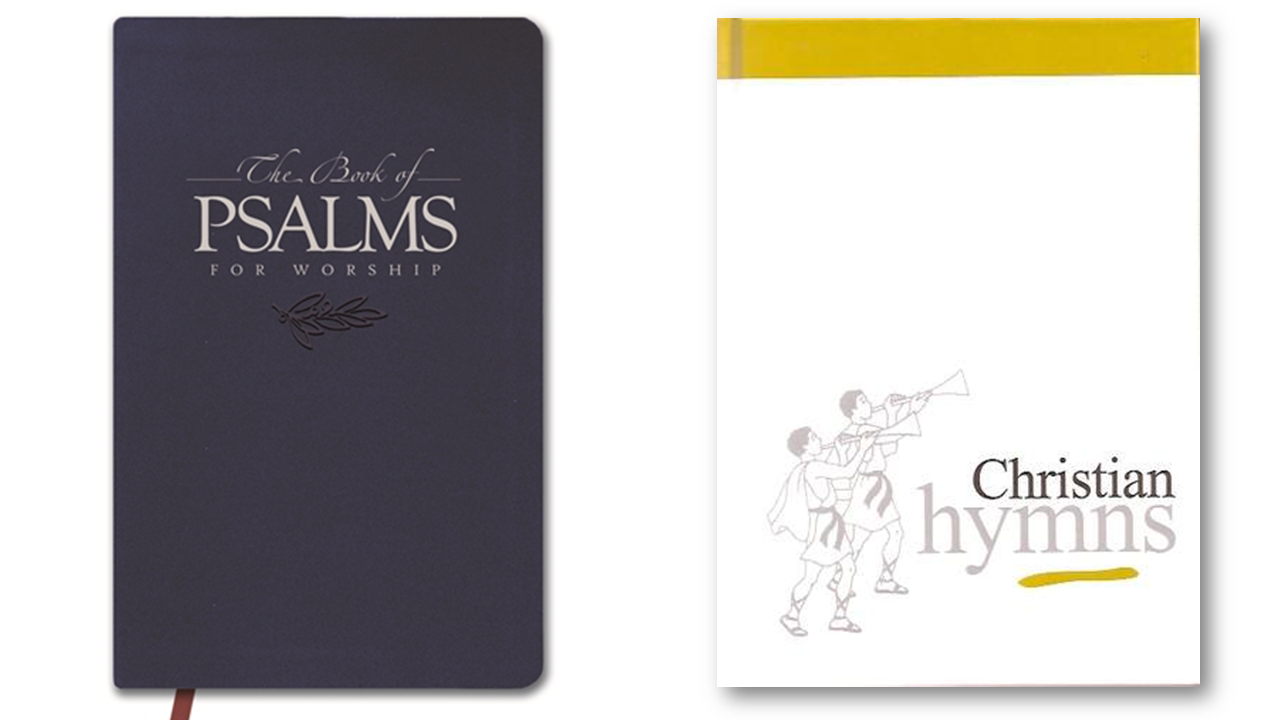
Singing Psalms
Christians in the early church liked to sing. Pliny reported back to the Roman emperor that the Christians were “singing hymns to Christ as a God.” Christian historian, Tertullian, recorded “the chanting of Psalms” in services.
For many years, the churches’ main hymnbook was a Latin translation of the 150 Psalms, known as a Psalter. The Reformation in the sixteenth century led to psalters in ordinary languages. Two influential ones were the 1562 Genevan Psalter (in French) and the 1650 Scottish Psalter (in English).
Psalm-singing is not so common today because the old-English Psalters became hard to understand. Our church uses a modern English psalter, The Book of Psalms for Worship, as well as other versions of Psalms.
Hymns and Spiritual Songs
The Reformation restored much to the churches that had been lost. This included hymn singing. It came to English Baptist churches in 1673 when Benjamin Keach began singing a hymn after the Lord’s Supper (inspired by Matthew 26:30).
We sing from (New) Christian Hymns. This selection aims to provide hymns on a range of subjects, selecting the best from a range of eras. The compilers sought to update archaic language where possible, without playing havoc with the rhyme.
There are a few medieval hymns. Be thou my vision is translated from an eighth century Irish source. Jesus thou joy of loving hearts is translated from words attributed to Bernard of Clairvaux.
There are some from the Reformation and the century after. Our hymnbook includes Luther’s A safe stronghold our God is still and Bunyan’s Who would true valour see.
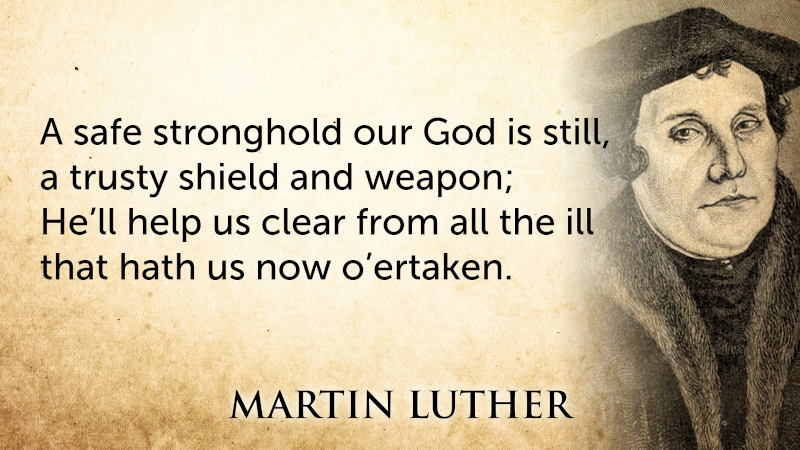
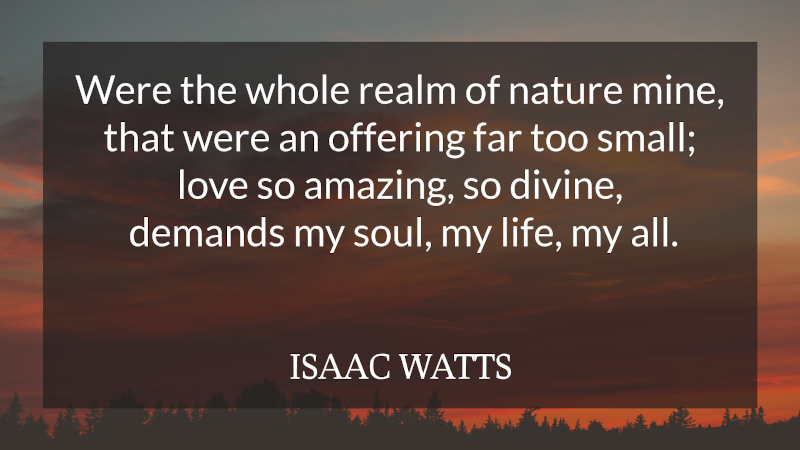
Eighteenth Century Hymns
Isaac Watts is known as the father of English hymnody, through the influence of his 1709 hymnbook. Our hymnbook includes his paraphrases of Psalms like Our God our help in ages past (based on Psalm 90) and Jesus shall reign where’er the sun (based on Psalm 72). Watts also wrote many fine hymns like Join all the glorious names, Not all the blood of beasts and When I survey the wondrous cross.
Converted slave trader, John Newton, produced a hymnbook with poet William Cowper called Olney Hymns. We sing Cowper’s great hymns like There is a fountain filled with blood, O for a closer walk with God and Jesus where’er thy people meet. We sing Newton’s great hymns like Glorious things of thee are spoken, Let us love and sing and wonder, One there is above all others and Why should I fear the darkest hour.
Probably the greatest hymn writer was Charles Wesley and he has more compositions in our hymnbook than any other writer. These include: And can it be, Jesus the name high over all, O for a thousand tongues, Rejoice the Lord is king, Lo he comes with clouds descending (with Cennick), Arise my soul arise, Tis finished the Messiah dies and Jesu, lover of my soul. His brother John was better known as a translator of hymns such as Zinzendorf’s Jesus your blood and righteousness.
Several other memorable hymns came out of the eighteenth century. These include: How firm a foundation (anonymous), Rock of Ages (Toplady), Come thou fount of every blessing (Robinson), Come ye sinners poor and wretched (Hart) and I know that my redeemer lives (Medley). The cream of the eighteenth century hymns – those that stood the test of time – are some of the most profound, Christ-centred and experientially deep in our hymnbook.
Nineteenth Century Hymns
The nineteenth century saw a growing diversity of hymns, and a growing number of American hymnwriters.
No writer dominated like Wesley or Watts. Bonar wrote more than some, such as Thy works not mine O Christ and Thy way not mine O Lord. Often writers are best remembered for one hymn: Teach me Your way O Lord (Ramsey), Immortal honours (Gadsby), Man of sorrows (Bliss), The Sands of times are sinking (Cousin), Praise my soul the king of heaven (Lyte), Here is love vast as the Ocean (Rees), We rest on thee (Cherry) or What a friend we have in Jesus (Scriven).
Low-literacy and expensive books had previously resulted in hymns being “lined out.” This meant a leader singing a line of a hymn and the congregation repeating it. Some nineteenth century hymnwriters used a new feature which made hymns more accessible to the unchurched and illiterate: the memorable chorus. More straightforward content, lively music and catchy tunes helped too.
Well known examples include: To God be the glory (Crosby), One day when heaven (Chapman), I know not why God’s wondrous grace (Whittle), My hope is built (Mote) and It is well with my soul (Spafford).
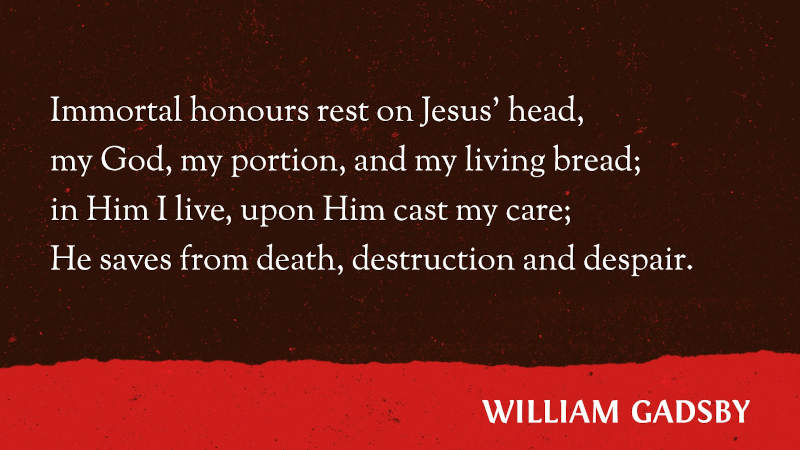
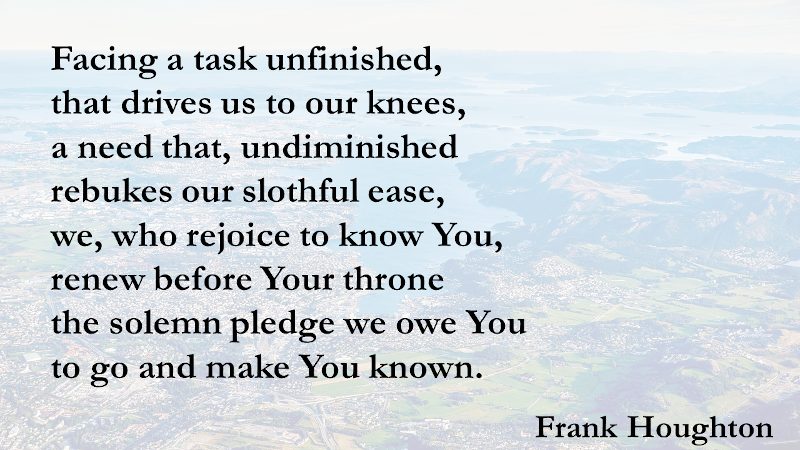
Twentieth & Twenty-First Century Hymns
The range of hymns widened still further in the twentieth century. There were translations from Sweden How great thou art (Hine/ Harrison) and Rwanda O how the grace of God (Sibomana). There were those by English Anglicans: Christ Triumphant (Saward), To him we come (Seddon) and Tell out my soul and Safe in the Shadow of the Lord (Dudley-Smith). Others include Facing a task unfinished (Houghton), Great is thy faithfulness (Chisholm) and Before the throne of God above (de Chenez).
One of the most prolific hymn writers in the second half of the twentieth century was Graham Kendrick. Our hymnbook includes All I once held dear, Come and see and Servant King.
Recently, there has been a move towards professional worship leaders and song writers. This has meant that a good number of songs are unsuited to congregational singing: they are written to be performed. Songs which are uplifting and with general gospel or Christian themes have the widest appeal – so will raise the most revenue. There has also been a tendency to update an old hymn by adding a new tune or chorus, sometimes omitting more challenging verses.
Our hymnbook includes hymns from current hymnwriters with more substantial content that is suited to congregational singing. These include the modern classic In Christ alone (Townend/Getty) and How deep the Father’s love for us (Townend).
Whether singing Psalms or hymns, our aim is to obey the command to be “making melody to the Lord with your heart” (Eph 5:19). Though we appreciate good tunes, we want our emotions stirred through the words. It is wonderful when tune and words combine to leave us meditating on Christ.
